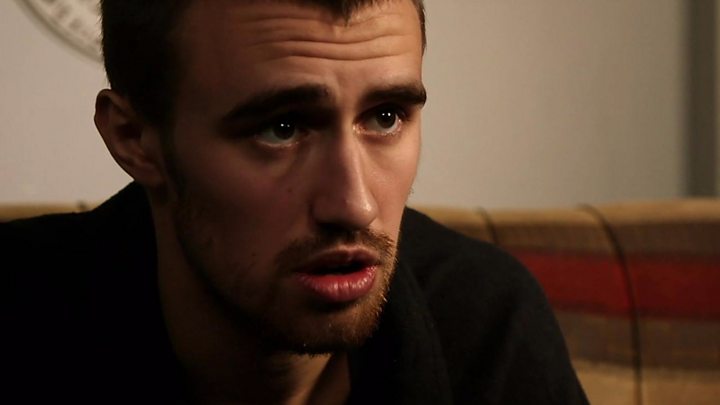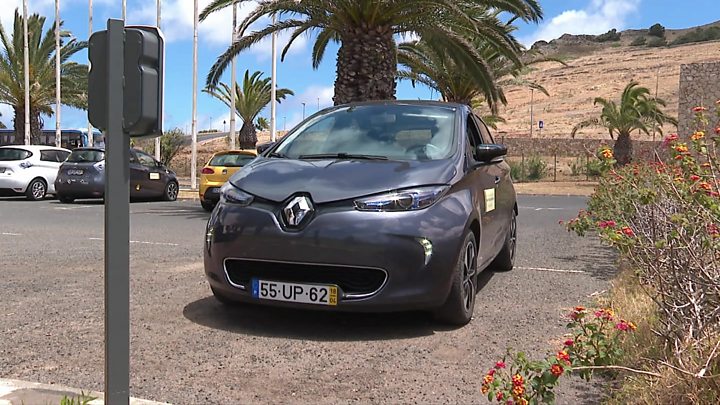
Media playback is unsupported on your device
Jack Letts, who left the UK to join the Islamic State group as a teenager, has said he had been an "enemy of Britain".
The Muslim convert, who is in custody in a Kurdish jail, admitted he was once ready to carry out a suicide attack.
The BBC interviewed the 23-year-old in October but it can only be reported now after his parents were convicted of funding terrorism by sending him cash.
The Home Office did not comment but has previously said it would try to block IS recruits hoping to return to the UK.
The interview is the fullest account yet of the Briton's time with IS in Syria, and Jack Letts said he was not speaking under duress.
Dubbed "Jihadi Jack" by the media, he converted to Islam aged 16.
Two years later, in 2014, he dropped out of studying for his A-levels at a school in Oxford, moved to Syria and joined IS - the jihadist terror group which became known worldwide for its brutal mass killings and beheadings.
He married a woman whose family were influential in the group in Fallujah, Iraq. He had a child, who he has never seen.
In 2017 he left IS, but was captured and is in a Kurdish-run jail in northern Syria.
The Briton, who has not been stripped of his UK citizenship and is a dual Canadian national, agreed to speak to the BBC, saying he wanted to come clean about his role in IS.
'I did what I did'
Reporter Quentin Sommerville, who interviewed the IS recruit while Kurdish security forces were present, said there were gaps in his story.
Challenged on whether he was a traitor, the IS fighter replied: "I know I was definitely an enemy of Britain.
"I did what I did," he added. "I made a big mistake, and that's what happened."
Pressed on why he abandoned the UK to join the jihadist group - which has carried out terror attacks across the world - he said: "I thought I was leaving something behind and going to something better."
He said his home life had been comfortable, adding: "I had a very good relationship with my mum, especially, and my dad as well, actually.
"I used to work with my dad. He was a farmer... I used to love actually working with him. I had a very good relationship."
He said he thinks the decision to travel to Syria was a "weird combination of thoughts" and "weird sort of confusion".
"I thought it was some sort of morality actually at the time," he said. "Why do I have this nice life, and others don't? And then, on top of that, the idea of it being an Islamic state and it's actually your duty to do this.
"I think it was probably just a very emotionally-driven period of my life. I'm just glad that I didn't die."
'I wouldn't give me a second chance'
The former IS member said the group used to "encourage you in a sort of indirect way" to put on a suicide vest. He said he made it obvious to militants that "if there was a battle, I'm ready".
"I used to want to at one point, believe it or not" he added. "Not a vest. I wanted to do it in a car. I said if there's a chance, I will do it."
He said he now believes suicide attacks are "haram"- meaning forbidden in Islamic law.
He said at the start he loved living in Raqqa. He fought on the frontlines and was badly injured in Iraq.
One of the main reasons he left IS, he said, was because they started to kill people who he knew were Muslims.
"I didn't have a full plan. I thought I'd just get to Turkey and ring my mum, and just be like, 'I want to meet you somehow'."
'Poster boy'
His parents, John Letts, 58, and Sally Lane, 57, faced trial, accused of sending or trying to send their son money after he had joined IS.
On Friday, they were found guilty of one charge of funding terrorism by sending £223 in 2015. They were cleared of sending him a further £1,000 and the jury could not reach a verdict on a third charge related to an attempt to send £500.
When told that there was very little appetite in the UK to give him a second chance, Mr Letts said: "It's not like I'm appealing to the British public to give me a second chance.
"If I was a member of the British public, I wouldn't give me a second chance probably."
Challenged that his recruitment to IS - as a Westerner who travelled from Britain - was a rallying cry for the terror group, he said he realised it "had more meaning" than for a Syrian recruit, and added that IS used him as a sort of "poster boy".
"The fact that I came from England, et cetera, I understand that it made a big difference."
Although admitting he fought for IS, he said he did not believe he killed anyone.
As a dual national, he has been in touch with Canadian authorities and they are believed to be considering allowing him to leave Syria for Canada.
The Home Office did not comment on the case, but believes that anyone who travels to Syria is putting themselves in danger and could pose a national security risk to the UK.
Home Secretary Sajid Javid has previously said he would "not hesitate" to prevent the return of people who travelled to support IS.
In an interview with the Times, Mr Javid said that a range of measures were available to "stop people who pose a serious threat from returning to the UK, including depriving them of their British citizenship or excluding them from the country".
https://www.bbc.com/news/uk-48624104
2019-06-22 05:42:45Z
CBMiJGh0dHBzOi8vd3d3LmJiYy5jb20vbmV3cy91ay00ODYyNDEwNNIBKGh0dHBzOi8vd3d3LmJiYy5jb20vbmV3cy9hbXAvdWstNDg2MjQxMDQ


